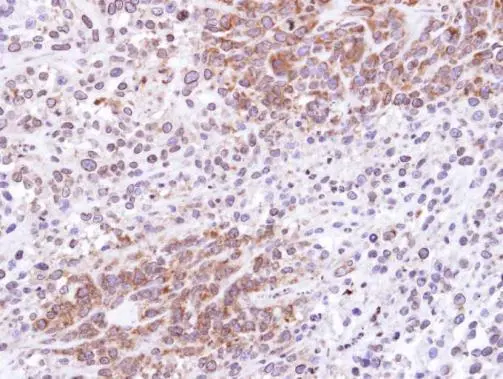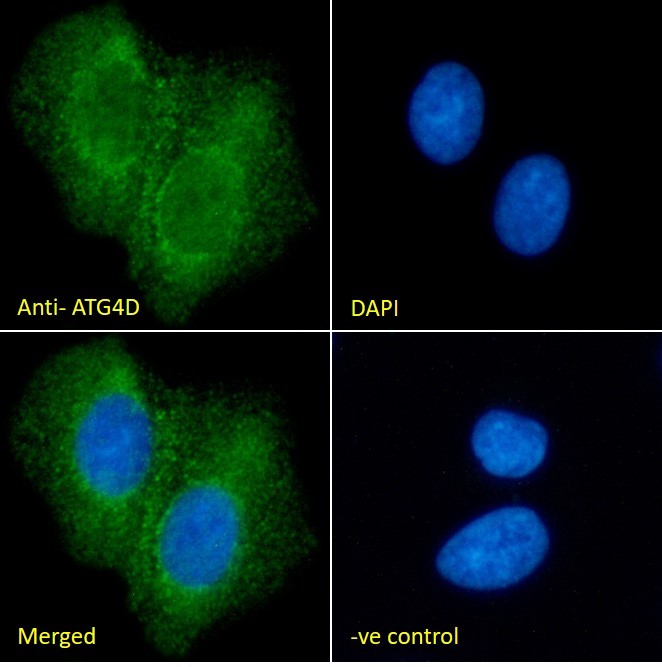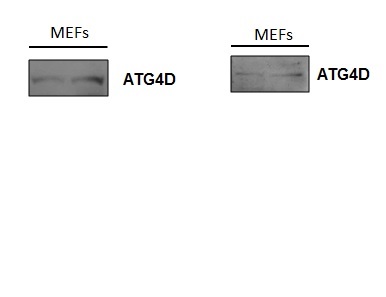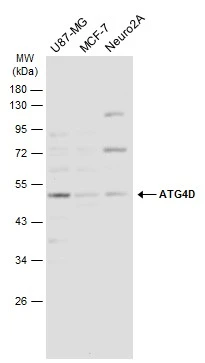
Immunohistochemical analysis of paraffin-embedded SAS xenograft , using ATG4D(GTX106114) antibody at 1:100 dilution.
Antigen Retrieval: Trilogy? (EDTA based, pH 8.0) buffer, 15min
ATG4D antibody [N3C3]
GTX106114
ApplicationsImmunoFluorescence, ImmunoCytoChemistry, ImmunoHistoChemistry, ImmunoHistoChemistry Paraffin
Product group Antibodies
ReactivityHuman, Mouse, Rat
TargetATG4D
Overview
- SupplierGeneTex
- Product NameATG4D antibody [N3C3]
- Delivery Days Customer9
- Application Supplier NoteICC/IF: 1:100-1:1000. IHC-P: 1:100-1:1000. *Optimal dilutions/concentrations should be determined by the researcher.Not tested in other applications.
- ApplicationsImmunoFluorescence, ImmunoCytoChemistry, ImmunoHistoChemistry, ImmunoHistoChemistry Paraffin
- CertificationResearch Use Only
- ClonalityPolyclonal
- Concentration1.53 mg/ml
- ConjugateUnconjugated
- Gene ID84971
- Target nameATG4D
- Target descriptionautophagy related 4D cysteine peptidase
- Target synonymsAPG4-D, APG4D, AUTL4, HsAPG4D, SPGF101, cysteine protease ATG4D, APG4 autophagy 4 homolog D, ATG4 autophagy related 4 homolog D, AUT-like 4 cysteine endopeptidase, autophagin-4, autophagy-related cysteine endopeptidase 4, autophagy-related protein 4 homolog D, cysteine protease involved in autophagy
- HostRabbit
- IsotypeIgG
- Protein IDQ86TL0
- Protein NameCysteine protease ATG4D
- Scientific DescriptionAutophagy is the process by which endogenous proteins and damaged organelles are destroyed intracellularly. Autophagy is postulated to be essential for cell homeostasis and cell remodeling during differentiation, metamorphosis, non-apoptotic cell death, and aging. Reduced levels of autophagy have been described in some malignant tumors, and a role for autophagy in controlling the unregulated cell growth linked to cancer has been proposed. This gene encodes a member of the autophagin protein family. The encoded protein is also designated as a member of the C-54 family of cysteine proteases. [provided by RefSeq]
- ReactivityHuman, Mouse, Rat
- Storage Instruction-20°C or -80°C,2°C to 8°C
- UNSPSC41116161

![ATG4D antibody [N3C3] detects ATG4D protein at cytoplasm in mouse ovary by immunohistochemical analysis. Sample: Paraffin-embedded mouse ovary. ATG4D antibody [N3C3] (GTX106114) diluted at 1:500.
Antigen Retrieval: Citrate buffer, pH 6.0, 15 min ATG4D antibody [N3C3] detects ATG4D protein at cytoplasm in mouse ovary by immunohistochemical analysis. Sample: Paraffin-embedded mouse ovary. ATG4D antibody [N3C3] (GTX106114) diluted at 1:500.
Antigen Retrieval: Citrate buffer, pH 6.0, 15 min](https://www.genetex.com/upload/website/prouct_img/normal/GTX106114/GTX106114_42046_20150512_IHC_M_w_23060120_707.webp)
![ATG4D antibody [N3C3] detects ATG4D protein at cytoplasm in rat muscle by immunohistochemical analysis. Sample: Paraffin-embedded rat muscle. ATG4D antibody [N3C3] (GTX106114) diluted at 1:500.
Antigen Retrieval: Citrate buffer, pH 6.0, 15 min ATG4D antibody [N3C3] detects ATG4D protein at cytoplasm in rat muscle by immunohistochemical analysis. Sample: Paraffin-embedded rat muscle. ATG4D antibody [N3C3] (GTX106114) diluted at 1:500.
Antigen Retrieval: Citrate buffer, pH 6.0, 15 min](https://www.genetex.com/upload/website/prouct_img/normal/GTX106114/GTX106114_42606_20161116_IHC-P_R_w_23060120_376.webp)
![ATG4D antibody [N3C3] detects ATG4D protein at cytoplasm by immunofluorescent analysis. Sample: 293T cells were fixed in 4% paraformaldehyde at RT for 15 min. Green: ATG4D protein stained by ATG4D antibody [N3C3] (GTX106114) diluted at 1:200. Blue: Hoechst 33342 staining. ATG4D antibody [N3C3] detects ATG4D protein at cytoplasm by immunofluorescent analysis. Sample: 293T cells were fixed in 4% paraformaldehyde at RT for 15 min. Green: ATG4D protein stained by ATG4D antibody [N3C3] (GTX106114) diluted at 1:200. Blue: Hoechst 33342 staining.](https://www.genetex.com/upload/website/prouct_img/normal/GTX106114/GTX106114_42606_20161101_IFA_w_23060120_402.webp)







